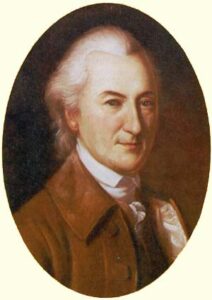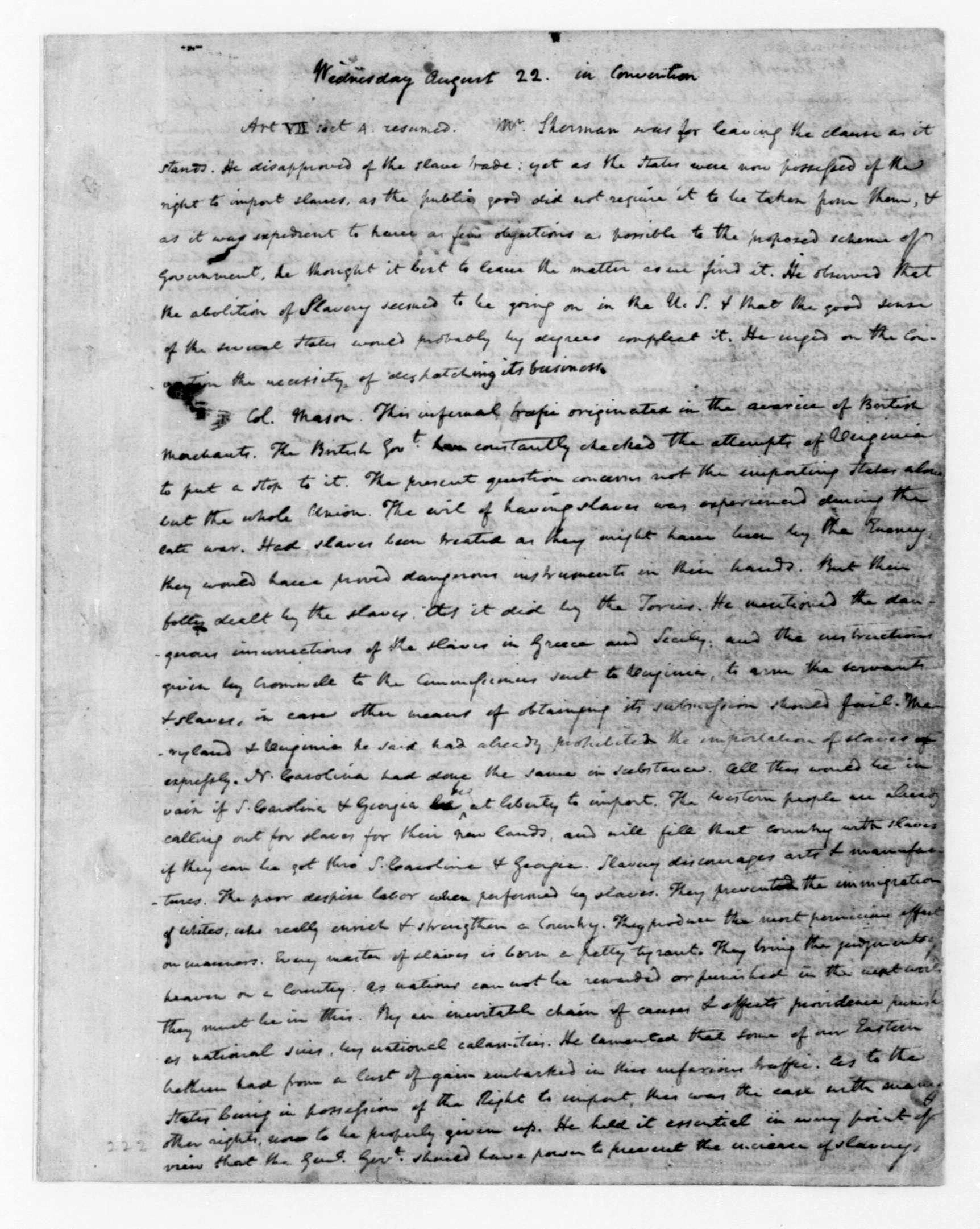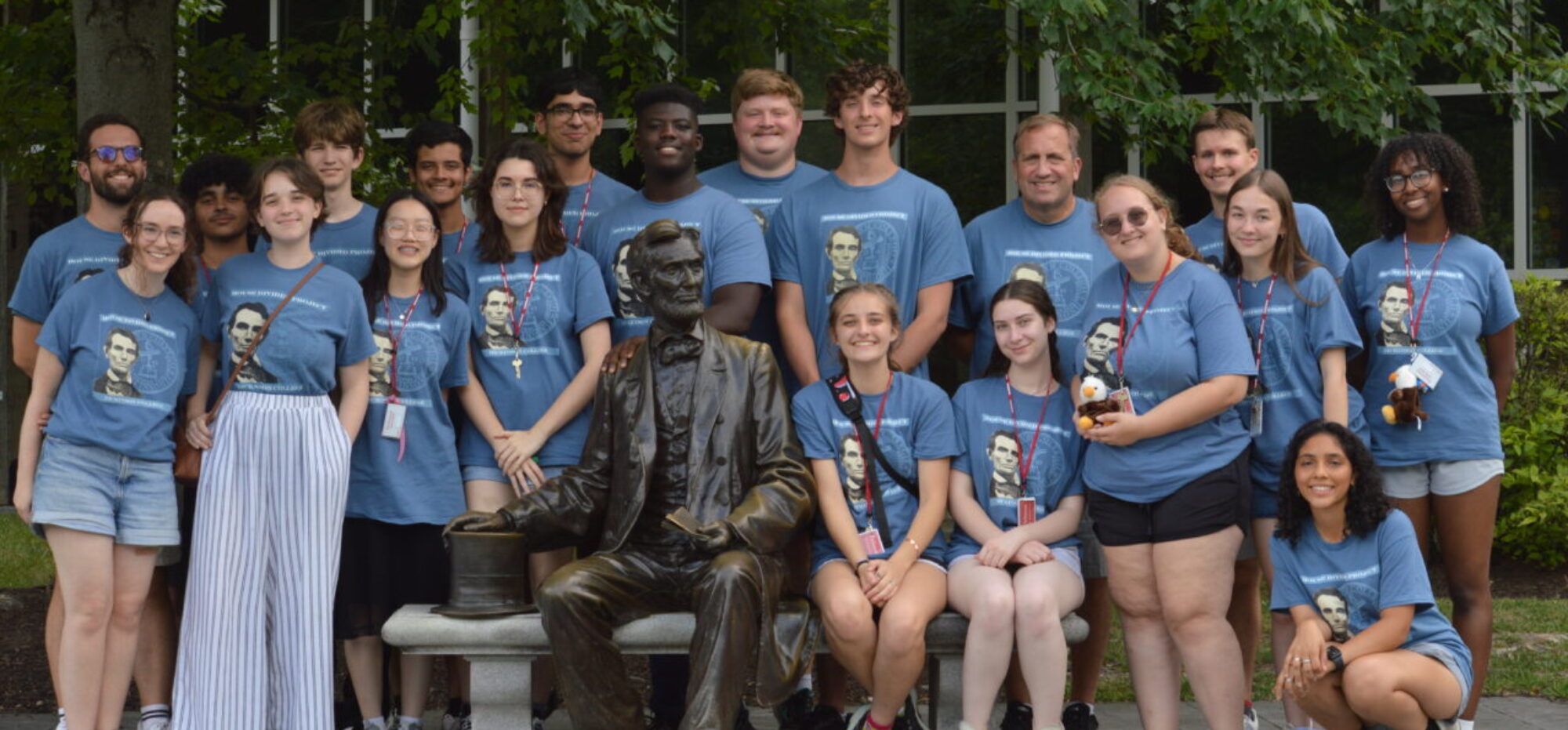What will be said of this new principle of founding a Right to govern Freemen on a power derived from Slaves[?] –John Dickinson
Every master of slaves is born a petty tyrant. They bring the judgment of heaven on a Country. As nations can not be rewarded or punished in the next world they must be in this. By an inevitable chain of causes & effects providence punishes national sins, by national calamities. –George Mason
INTRODUCTION

These excerpts cover the secret debates at the 1787 constitutional convention in Philadelphia from different sources, including a published collection with John Dickinson‘s notes for a speech in July and James Madison‘s notes from a day in August where the delegates discussed the African slave trade. What is critical about examining such behind-the-scenes arguments over the future of slavery in America is considering how candid some of the constitutional framers were in confronting the hypocrisy at the heart of their revolution. Some argued for purifying the American founding in the name of universal freedom and equality. Others claimed they could easily justify African slavery as essential to that experiment in self-government for white people. The rest seemed uncertain but determined to be practical as they sought to reunify the country during a period of crisis following independence.
SOURCE FORMAT: Government document (excerpts from notes)
WORD COUNT: 2,000 words (total from two sources)
RELATED TEXTS: Aristotle, Defense of slavery (350 BCE) // Constitution on Slavery (1787) // Dred Scott Decision (1857)
CONTEXT LECTURE: Constitution Making
John Dickinson, Notes for a speech, July 9, 1787
Acting before the World. What will be said of this new principle of founding a Right to govern Freemen on a power derived from Slaves in preference to other property themselves incapable of governing yet giving to others what they have not. The omitting the Word will be regarded as an Endeavour to conceal a principle of which we are ashamed.
Every Importation of Slaves will increase the power of the state over others. This principle I wish to avoid. A Calculation of the Value of Property I acknowledge to be impractical. Why not admit actual Contribution as the Rule. Objection from Massachusetts.
Is it to be taken for granted that no other Imposition is to be laid by the national Legislature. It is next to impossible. England and Holland with their vast Commerce and their Imposts and Excises have land taxes. Tis true their Laws extend to the Affairs and Expenses of the whole Nation. Here divided with the particular Legislatures but this national Legislature will certainly comprehend especially in Time allmost the whole Expenses of the Nation. The rest will be but a Drop in the Bucket.
National Debt and arrears of Expenses committees Proposition Objection from Massachusetts holds not in that Case if even Imposts and Excises were to be computed, yet the Inconvenience apprehended might be totally removed by a provision that the Representation of no state should rise beyond a certain proportion to its Neighbors. Emotion shall submit Half a Slave if adopted Ruinous to the whole system. Former jointments the same. 3 arguments only used.
1. Equality of Representation
2. England and Holland.
3. Resolution of Sept. 1774.
As to the first. It subtracts the only Reason on which our Objection is founded. Attention to Interests of particular states. Dependencies not parts. Government of Republics over their Dependencies. As to second they are selected by the same King equal to all his subjects. Despotism will be thought better than such a Dominion of fellow Citizens. As to the 3 absolutely perpetually confirmed afterwards by the Confederation. Having endeavoured to remove these Objections I now pass to the Consideration of the System on Policy and Justice.
CITATION: John Dickinson, Notes for a Speech, July 9, 1787, Reproduced from ConSource
James Madison’s Notes, August 22, 1787

Art VII sect 4. resumed. Mr. SHERMAN was for leaving the clause as it stands. He disapproved of the slave trade; yet as the States were now possessed of the right to import slaves, as the public good did not require it to be taken from them, & as it was expedient to have as few objections as possible to the proposed scheme of Government, he thought it best to leave the matter as we find it. He observed that the abolition of Slavery seemed to be going on in the U. S. & that the good sense of the several States would probably by degrees compleat it. He urged on the Convention the necessity of despatching its business.
Col. MASON. This infernal trafic originated in the avarice of British Merchants. The British Govt. constantly checked the attempts of Virginia to put a stop to it. The present question concerns not the importing States alone but the whole Union. The evil of having slaves was experienced during the late war. Had slaves been treated as they might have been by the Enemy, they would have proved dangerous instruments in their hands. But their folly dealt by the slaves, as it did by the Tories. He mentioned the dangerous insurrections of the slaves in Greece and Sicily; and the instructions given by Cromwell to the Commissioners sent to Virginia, to arm the servants & slaves, in case other means of obtaining its submission should fail. Maryland & Virginia he said had already prohibited the importation of slaves expressly. N. Carolina had done the same in substance. All this would be in vain if S. Carolina & Georgia be at liberty to import. The Western people are already calling out for slaves for their new lands, and will fill that Country with slaves if they can be got thro’ S. Carolina & Georgia. Slavery discourages arts & manufactures. The poor despise labor when performed by slaves. They prevent the immigration of Whites, who really enrich & strengthen a Country. They produce the most pernicious effect on manners. Every master of slaves is born a petty tyrant. They bring the judgment of heaven on a Country. As nations can not be rewarded or punished in the next world they must be in this. By an inevitable chain of causes & effects providence punishes national sins, by national calamities. He lamented that some of our Eastern brethren had from a lust of gain embarked in this nefarious traffic. As to the States being in possession of the Right to import, this was the case with many other rights, now to be properly given up. He held it essential in every point of view that the Genl. Govt. should have power to prevent the increase of slavery.
Mr. ELSWORTH. As he had never owned a slave could not judge of the effects of slavery on character: He said however that if it was to be considered in a moral light we ought to go farther and free those already in the Country. -As slaves also multiply so fast in Virginia & & Maryland that it is cheaper to raise than import them, whilst in the sickly rice swamps foreign supplies are necessary, if we go no farther than is urged, we shall be unjust towards S. Carolina & Georgia. Let us not intermeddle. As population increases poor laborers will be so plenty as to render slaves useless. Slavery in time will not be a speck in our Country. Provision is already made in Connecticut for abolishing it. And the abolition has already taken place in Massachusetts. As to the danger of insurrections from foreign influence, that will become a motive to kind treatment of the slaves.
Mr. PINKNEY. If slavery be wrong, it is justified by the example of all the world. He cited the case of Greece Rome & other antient States; the sanction given by France England, Holland & other modern States. In all ages one half of mankind have been slaves. If the S. States were let alone they will probably of themselves stop importations. He wd. himself as a Citizen of S. Carolina vote for it. An attempt to take away the right as proposed will produce serious objections to the Constitution which he wished to see adopted.
General PINKNEY declared it to be his firm opinion that if himself & all his colleagues were to sign the Constitution & use their personal influence, it would be of no avail towards obtaining the assent of their Constituents. S. Carolina & Georgia cannot do without slaves. As to Virginia she will gain by stopping the importations. Her slaves will rise in value, & she has more than she wants. It would be unequal to require S. C. & Georgia to confederate on such unequal terms. He said the Royal assent before the Revolution had never been refused to S. Carolina as to Virginia. He contended that the importation of slaves would be for the interest of the whole Union. The more slaves, the more produce to employ the carrying trade; The more consumption also, and the more of this, the more of revenue for the common treasury. He admitted it to be reasonable that slaves should be dutied like other imports, but should consider a rejection of the clause as an exclusion of S. Carola. from the Union.
Mr. BALDWIN had conceived national objects alone to be before the Convention, not such as like the present were of a local nature. Georgia was decided on this point. That State has always hitherto supposed a Genl. Governmt. to be the pursuit of the central States who wished to have a vortex for every thing- that her distance would preclude her from equal advantage-& that she could not prudently purchase it by yielding national powers. From this it might be understood in what light she would view an attempt to abridge one of her favorite prerogatives. If left to herself, she may probably put a stop to the evil. As one ground for this conjecture, he took notice of the sect of ——– which he said was a respectable class of people, who carried their ethics beyond the mere equality of men, extending their humanity to the claims of the whole animal creation.
Mr. WILSON observed that if S. C. & Georgia were themselves disposed to get rid of the importation of slaves in a short time as had been suggested, they would never refuse to Unite because the importation might be prohibited. As the Section now stands all articles imported are to be taxed. Slaves alone are exempt. This is in fact a bounty on that article.
Mr. GERRY thought we had nothing to do with the conduct of the States as to Slaves, but ought to be careful not to give any sanction to it.
Mr. DICKENSON considered it as inadmissible on every principle of honor & safety that the importation of slaves should be authorised to the States by the Constitution. The true question was whether the national happiness would be promoted or impeded by the importation, and this question ought to be left to the National Govt. not to the States particularly interested. If Engd. & France permit slavery, slaves are at the same time excluded from both those Kingdoms. Greece and Rome were made unhappy by their slaves. He could not believe that the Southn. States would refuse to confederate on the account apprehended; especially as the power was not likely to be immediately exercised by the Genl. Government.
Mr. WILLIAMSON stated the law of N. Carolina on the subject, to wit that it did not directly prohibit the importation of slaves. It imposed a duty of 5. on each slave imported from Africa. 10 on each from elsewhere, & 50 on each from a State licensing manumission. He thought the S. States could not be members of the Union if the clause shd. be rejected, and that it was wrong to force any thing down, not absolutely necessary, and which any State must disagree to.
Mr. KING thought the subject should be considered in a political light only. If two States will not agree to the Constitution as stated on one side, he could affirm with equal belief on the other, that great & equal opposition would be experienced from the other States. He remarked on the exemption of slaves from duty whilst every other import was subjected to it, as an inequality that could not fail to strike the commercial sagacity of the Northn. & middle States.
Mr. LANGDON was strenuous for giving the power to the Genl. Govt. He cd. not with a good conscience leave it with the States who could then go on with the traffic, without being restrained by the opinions here given that they will themselves cease to import slaves.
Genl. PINKNEY thought himself bound to declare candidly that he did not think S. Carolina would stop her importations of slaves in any short time, but only stop them occasionally as she now does. He moved to commit the clause that slaves might be made liable to an equal tax with other imports which he he thought right & wch. wd. remove one difficulty that had been started.
Mr. RUTLIDGE. If the Convention thinks that N. C. S. C. & Georgia will ever agree to the plan, unless their right to import slaves be untouched, the expectation is vain. The people of those States will never be such fools as to give up so important an interest. He was strenuous agst. striking out the Section, and seconded the motion of Genl. Pinkney for a commitment.
CITATION: James Madison, Notes on Debates in the Federal Convention, August 22, 1787, FULL TEXT via Avalon Project at Yale Law School
SEMINAR QUESTIONS
- When John Dickinson was talking about “omitting the Word,” in regard to referencing slavery by name, what effect did he want to have by calling this out? Did he want to call out the South’s hypocrisy, or encourage a reflection towards change? (Alden Miller)
- In Madison’s notes from 1787, George Mason states, “Every master of slaves is born a petty tyrant.” Would Mason have considered himself a petty tyrant or would he have taken Locke’s words and interpreted them in a way that benefited himself? (Kati Shanaman)
- Charles Pinckney justified slavery by stating that both ancient and modern civilizations had used it, yet he disregarded the fact that the American system of enslavement was uniquely race-based. How does his argument continue to distort our view on the history of American slavery today? (Ava Yuninger)
ADDITIONAL RESOURCES
Each day I walk around campus with a slaveholder’s name across my chest. –A student of color at Dickinson, 2019 Dickinson & Slavery report
- FEATURED COLLECTION: Avalon Project at Yale Law School: 1787 Debates and Avalon Project: Documentary Record with State Constitutions
- Matthew Pinsker, Arguing Over Slavery in the Constitution, History 404, Dickinson College (Fall 2015)
- Matthew Pinsker, ed., College Founding, Dickinson & Slavery (2018)
- STUDENT CLOSE READING: By Nick Rickert (’22)
